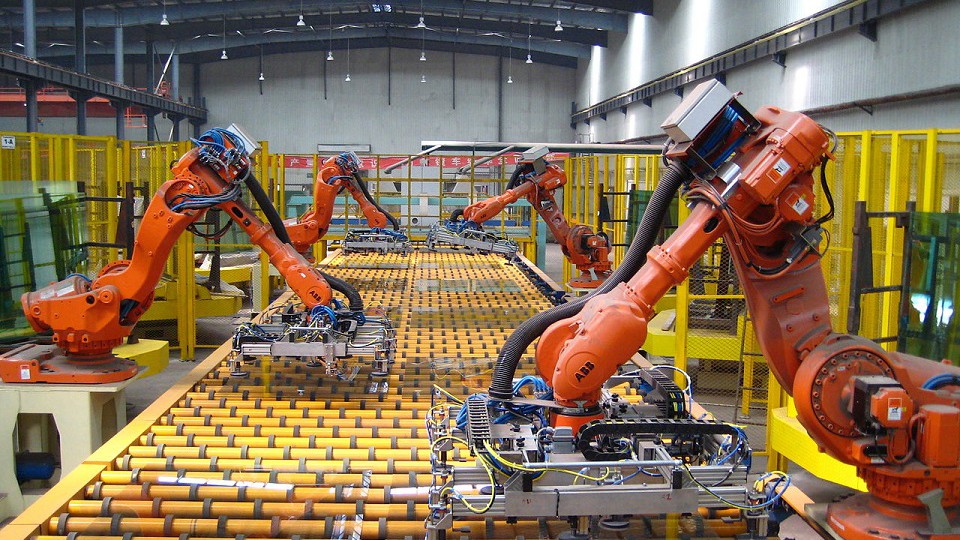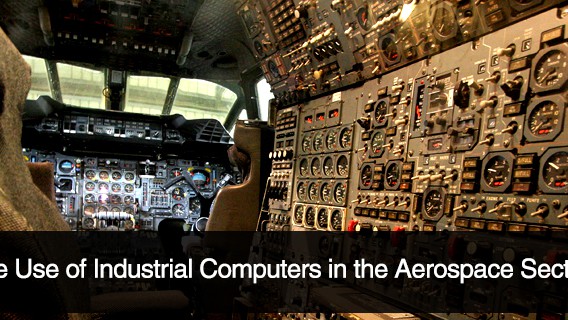With the advent of Industry 4.0, traditional factories are becoming obsolete. Though factories are no stranger to automation, advancements in industrial computers, artificial intelligence, IoT (Internet of Things), cloud computing, and other highly advanced digital technologies have completely reshaped the factory as we know it. By leveraging previously unheard of connectivity levels to cut costs, reduce labor needs, and shrink the space needed for operations, smart factories can increase production, raise profits, and improve customer satisfaction.
What Is a “Smart” Factory?
Article Guide
A smart factory is a space in which manufacturing equipment is intertwined with digital technology to increase production efficiency through constant monitoring and self-optimization. The innovations of smart manufacturing would not be possible without advances in IoT (Internet of things) technology and big data analysis.
Digital sensors gather data from the factory floor and relay that data wirelessly to an industrial computer located either on the factory floor or in a centralized control room (often both). The computer then analyzes the information, relays it back to the production machinery for automated self-optimization, and visualizes the data for factory support staff, allowing the factory to respond to on-the-floor issues in real-time, well before being noticed by human observation.
Continuous digital monitoring means more consistency at every step of the fabrication process. The factory floor is, in turn, networked to suppliers and even customer support, all of which allows for a level of quality control and on-the-floor responsiveness that had previously been impossible.
It’s no wonder a recent study found that 24% of manufacturing companies worldwide have implemented smart manufacturing technology, with a further 22% in the initial implementation stages. By utilizing such advanced technology, smart factories lower production costs by increasing efficiency and reducing the need for human labor, meaning greater output, higher quality products, and increased customer satisfaction overall.
Why Are Industrial Computers Essential for Smart Factories?
Factories are harsh environments that most off-the-shelf computers just cannot handle. Vibrations caused by machinery can break a computer’s parts. Industrial processes will often produce particulate waste that gets sucked into PC cooling fans and destroy the computer’s internal components. Screens often break due to physical debris. Extreme temperatures caused by a lack of climate control and heat generated from industrial processes can destroy most computers. Some companies have found themselves replacing their consumer-grade computers every three months due to the conditions present within their factories.
On the other hand, industrial computers are built to endure whatever conditions the factory throws at them. Their rugged construction means they are IEC60068 certified for shock and vibration. Fanless cooling takes advantage of heat sink technology to efficiently manage temperature without moving parts or intake vents, protecting the interior components from dust and other particles. It also means they can handle extreme temperatures and even humidity, which is hugely important for many factories.
Production Bottlenecks and Data Visualization
Production bottlenecks are all too common in traditional manufacturing. Until recently, manufacturers often could not catch these slowdowns until it was already too late and the situation had become catastrophic. Billions of dollars are lost every year as a result of such production delays. Smart factories help prevent production bottlenecks through the deployment of IoT sensors and data visualization.
Smart cameras measure throughput at every step of production and relay that information to a computer for analysis. Other IoT-enabled sensors can check things like temperature, vibration, pressure, etc., to see if machines are on the verge of overheating, breaking down, or are otherwise miscalibrated and in need of attention. In this way, production slowdowns are detected early, sometimes before they even happen, allowing operators to address them promptly and stoping production delays in their tracks.
All of this data is useless, however, if there is no way to visualize it. An industrial panel PC with tempered shatter-resistant touchglass can visualize data while withstanding common production floor hazards. Used as an HMI Panel, these powerful machines can analyze and create a visual representation of your data in seconds. Should the system detect a production slowdown, operators can spot it immediately and shift their attention and resources accordingly.
Additionally, industrial panel PCs are customizable with optional features such as 2d scanners, RFID, smart card readers, and biometric scanners, which can be used in conjunction with other sensors to increase productivity and efficiency.
Smart Sensors and Climate Control
Most smart factories are not built from the ground up. Instead, manufacturers retrofit their existing facilities with new technology. Existing facilities often present unique challenges that a brand new facility would not. For instance, many older factories lack climate control systems or face expensive energy bills due to running these systems non-stop – even when they’re not needed. Fortunately, the technology that makes smart manufacturing possible can also make climate control more cost-effective.
Using a network of IoT heat and humidity sensors, it is possible to integrate your climate control system into your overall smart manufacturing plan. The system can then manage a climate control system and efficiently regulate the temperature throughout a factory.
In one part of the factory, temperature sensors can detect a heat spike and relay that information to a mini rugged PC, which can then direct exhaust vents to open, activate cooling systems, and even shut down equipment if necessary. Conversely, should heat sensors catch a sudden drop in temperature in another part of the factory, the mini rugged PC could direct heaters to only heat that one area. By taking such decisions out of human hands, you can increase responsiveness and minimize the costs associated with climate control.
Not only can Mini Rugged PCs withstand the heat in a factory without climate control, but they can also, in turn, allow manufacturers to upgrade their smart factory with smart climate control.
Inventory Management and the Power of Mobility
Inventory management can be a massive headache for any manufacturing operation. Keeping track of all of your assets can seem like an impossible task, especially if you rely on outdated systems and technology that do not integrate with the rest of your operation. Even up-to-date inventory management systems force manufacturers to rely on third-party barcode scanners and other peripherals, which cannot themselves analyze or visualize the data they collect and are just more pieces of equipment for your workers to lug around. It can be tempting to cut corners, but poor inventory management will inevitably cause a cascade of ever-worsening problems for your operation.
Smart factories streamline inventory management using RFID technology. Factory workers can quickly scan small adhesive RFID tags affixed to packaging, products, and other material assets with an RFID-enabled industrial tablet. The wireless scan is quicker than an optical 2-d scan. It requires less physical maneuvering on the part of the person holding the scanner, making the task both more ergonomic and economical than it otherwise would be.
Unlike other scanning peripherals, industrial tablets are their own powerful wireless computing devices, undergirded by Intel i5 and i7 processors’ computing ability. They can not only transmit inventory to a central database but can analyze the data themselves. As part of a network, they can serve as portable data visualization displays, alerting workers to inventory shortages as they happen.
Industrial tablets offer factory operators several additional benefits beyond streamlining inventory management. Their lightweight, rugged construction means they can handle drops and impacts often prevalent in busy industrial environments. The portability offered by industrial tablets makes shifting between operations on the factory floor a breeze. Additionally, optional 4G cellular capabilities allow operators to work anywhere, which improves responsiveness, speeds up production, and increases profits.
No smart factory is truly complete without the integration of industrial tablets into its operation.
Final Thoughts
Put simply, the vast majority of computers on the market cannot handle the conditions found within most factories. Manufacturers must rely on alternatives to consumer-grade computers if they want to take advantage of all of the benefits that smart manufacturing offers.
Industrial computers and tablets offer the computing power necessary to handle the advanced data processing entailed by smart manufacturing. Smart factories process vast quantities of data from every step of the manufacturing process, and industrial computers have the processing power to handle all of that information with ease.
Smart factories are the future of manufacturing. Contact an expert at Cybernet today you are interested in learning more about how industrial computers can help you enter the world of smart manufacturing.
Industrial Computers Are Revolutionizing Smart Factories
August 9, 2018
A revolution is underway in the industrial sector. Smart factories – automated facilities aimed at eliminating human error – are replacing their more traditional counterparts and expanding rapidly in the process. A…
0 Comments8 Minutes
The Use of Industrial Computers in the Aerospace Sector
September 17, 2015
Over recent years, industrial computers have come to take on a critical role in a number of professions. The aerospace industry is one sector that has come to rely on the use of these devices to address a number of…
0 Comments4 Minutes
You Can't
Learn from a Pop-up
But we can deliver knowledge to your inbox!
We dive deep in the industry looking for new trends, technology, news, and updates. We're happy to share them with you.
Knowledge, News, and Industry Updates Right in Your Inbox




